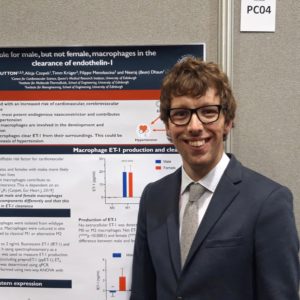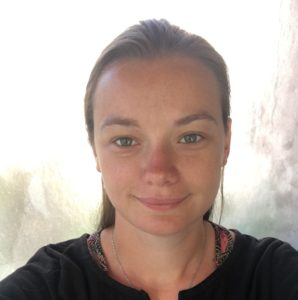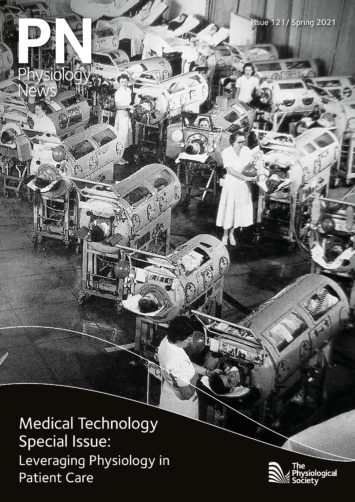
Physiology News Magazine
Meet the Early Career Theme Leads
Membership
Meet the Early Career Theme Leads
Membership
https://doi.org/10.36866/pn.121.36
Each Early Career Theme Lead represents one of The Society’s seven Themes, together with their equivalent Theme Leads, as a coordinator of the topic area and the focal point for members, with a particular focus on early career researcher (ECR) engagement. They help promote the Theme activities and encourage members and non-members to participate in Society events and activities. Key roles and responsibilities include organising the annual Future Physiology conference, organising ECR networking, and developing opportunities for professional development.
Susan Deuchars Chair of Conferences Committee (University of Leeds)
We are delighted to welcome these talented and passionate physiologists as our Early Career Theme Leads. Already, their energy and commitment is clear as they start to plan our next Future Physiology conference, with some innovative ideas for the programme. At The Physiological Society, we feel strongly that the input and opinions of our Early Career Researchers are of paramount importance in shaping the direction of The Society in all of our activities. They are the physiologists of the future and we are really appreciative of their efforts to ensure the continued vitality of The Society.
Daniel Brayson Early Career Trustee (University College London)
In the realm of learned societies, The Physiological Society is pioneering in its willingness to experiment with the incorporation of early career scientists into leadership roles. The introduction of ECR Theme Leads will further enhance the relationship between ECRs and The Society. First impressions are that we have recruited an excellent cohort of bright, enthusiastic physiologists who will surely contribute to a stimulating, dynamic and fun culture at The Society.
Cardiac & Vascular Physiology

Greg Sutton University of Edinburgh, UK
I am a fourth-year MRC Precision Medicine PhD student at the University of Edinburgh, UK. My main research interests are physiology, bioengineering, vascular biology and hypertension; however, my background is in infectious disease. I am also interested in teaching, networking, and enhancing academic engagement, particularly in under-represented groups.
I am proud to represent fellow early career cardiac and vascular physiologists at this important time. The Society, through its funding, conferences, and training events, has opened me up to new opportunities and helped me build new skills. I am looking forward to representing ECRs in The Society, looking for new ways for The Society to help with our professional progression and promote mentorship and greater engagement with early career physiologists.
Twitter: @endothelin1 https://twitter.com/endothelin1
Education & Teaching

Ruth Norman University of Leeds, UK
I am a teaching fellow in anatomy and physiology at the University of Leeds, UK and have been a member of The Physiological Society since the beginning of my PhD in 2012. My PhD was funded through teaching anatomy, which gave me invaluable experience alongside my research.
Having recently shifted focus from a cardiovascular field to more pedagogical interests, I have been impressed by the breadth of research and activities The Society provides. I have previously been involved with outreach events at past conferences and taken part in Physiology Friday. I believe ECRs from all areas in physiology can benefit from increasing their awareness and participation in education and teaching, which can provide rewarding experiences and skills for future careers.
Twitter: @ruthaanorman https://twitter.com/ruthaanorman
Endocrinology

Shelley Harris University of Southampton, UK
I have a long-standing interest in endocrinology, particularly its role within integrated physiology. My PhD at Oxford Brookes University, UK focused on thyroid hormones and their role in perinatal growth. Following this, I was a postdoc at the University of Oxford investigating steroid hormones and their role in fatty liver disease. Currently, I am working in the Placenta Lab at the University of Southampton, using multi-scale imaging techniques to understand placental growth and structure.
During my PhD, I was the only student in the department with a physiology focus, specifically endocrinology. As a member I have always felt hugely supported by The Society from receiving travel grants, being given the opportunity to present my research at meetings and publishing my first ever paper. As ECR Theme Lead, I am enthusiastic about developing and promoting the support and activities that The Society can offer to ECRs working in the Endocrinology Theme.
Twitter: @dr_shellsuit87 https://twitter.com/dr_shellsuit87
Epithelia & Membrane Transport

Jennifer Pearson-Farr University of Southampton, UK
I am a postdoctoral researcher in reproductive medicine at the Department of Human Development and Health, University of Southampton, UK. My research is focused on the 3D architecture and function of the endometrial epithelium, the lining of the womb, and how it is related to pregnancy outcome.
I am very excited to be the Early Career Theme Lead for the Epithelia and Membrane Transport Theme. This Theme encompasses such a vibrant and exciting research area, which I am proud to be a part of. I am looking forward to becoming more involved in The Physiological Society community and I aspire to help support and shape the Theme in a way that keeps early career members in mind. I would also like to encourage engagement and outreach activities.
Twitter: @PearsonFarr https://twitter.com/PearsonFarr
Human, Exercise & Environmental Physiology

Paul Ansdell Northumbria University, UK
I am currently a Lecturer in Exercise Physiology at Northumbria University, UK and recently completed my PhD studying sex differences in the integrative physiological responses to exercise. My research interests relate to diversity in physiological function, and how age, sex, and hormonal status influence acute and chronic responses to exercise.
The importance of physiology as a scientific discipline is becoming more and more evident, and I feel excited to be starting my career at a time like this. Undoubtedly, there are challenges facing ECRs currently, and in this role, I want to create opportunities for professional development whilst addressing those challenges. To do so, the other Early Career Research Theme Leads and I will be organising conferences, workshops, and other initiatives that promote the work of ECRs. Our collective aim is to enhance early career representation and participation within The Society.
Twitter: @paulansdell https://twitter.com/paulansdell
Metabolic Physiology

Kelly Bowden-Davies Manchester Metropolitan University, UK
I am a Lecturer in Exercise Physiology at Manchester Metropolitan University, UK. My research is focused on the effects of physical (in)activity and sedentary behaviour on integrative metabolism, studying adipose tissue, skeletal muscle and the liver. Previous and current work examines how alterations in physical activity and diet affect metabolism in healthy individuals, those at risk of metabolic disease and patients with Type 2 diabetes. Given the rising prevalence of metabolic diseases, it is important to understand how lifestyle changes can reduce disease risk as well as its therapeutic role in disease management.
I am elated to join the Metabolic Physiology Theme as the Early Career Lead. I aim to work collaboratively across The Society and represent the needs of my peers as well as connecting junior and senior colleagues. I recognise that this period presents unique challenges and welcome any comments that could be used to support our community.
Twitter: @kbowdendavies https://twitter.com/kbowdendavies
Neuroscience

Laura Rich University of Nottingham, UK
I graduated in 2016 from the University of Nottingham, UK with an honours degree in Neuroscience. During my degree I found my interest in glial cells and remained in Nottingham to undertake my Research Masters. I am still there now in the final year of my PhD investigating the metabolic interactions between neurons and glia in the central and peripheral nervous system.
Since attending Future Physiology 2017, my first conference, I have appreciated the support as an ECR from The Physiological Society, giving me the confidence to take on opportunities to engage further with The Society. (The professional development webinars certainly helped during the COVID-19 pandemic). I applied to become an ECR Theme Lead to contribute back to The Society and guide other ECRs along their scientific journey. I am looking forward to working with the other ECR Theme Leads and ECR members to develop the programme for Future Physiology 2021.
Twitter: @LauraRich95 https://twitter.com/LauraRich95
